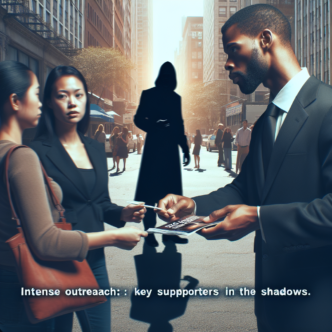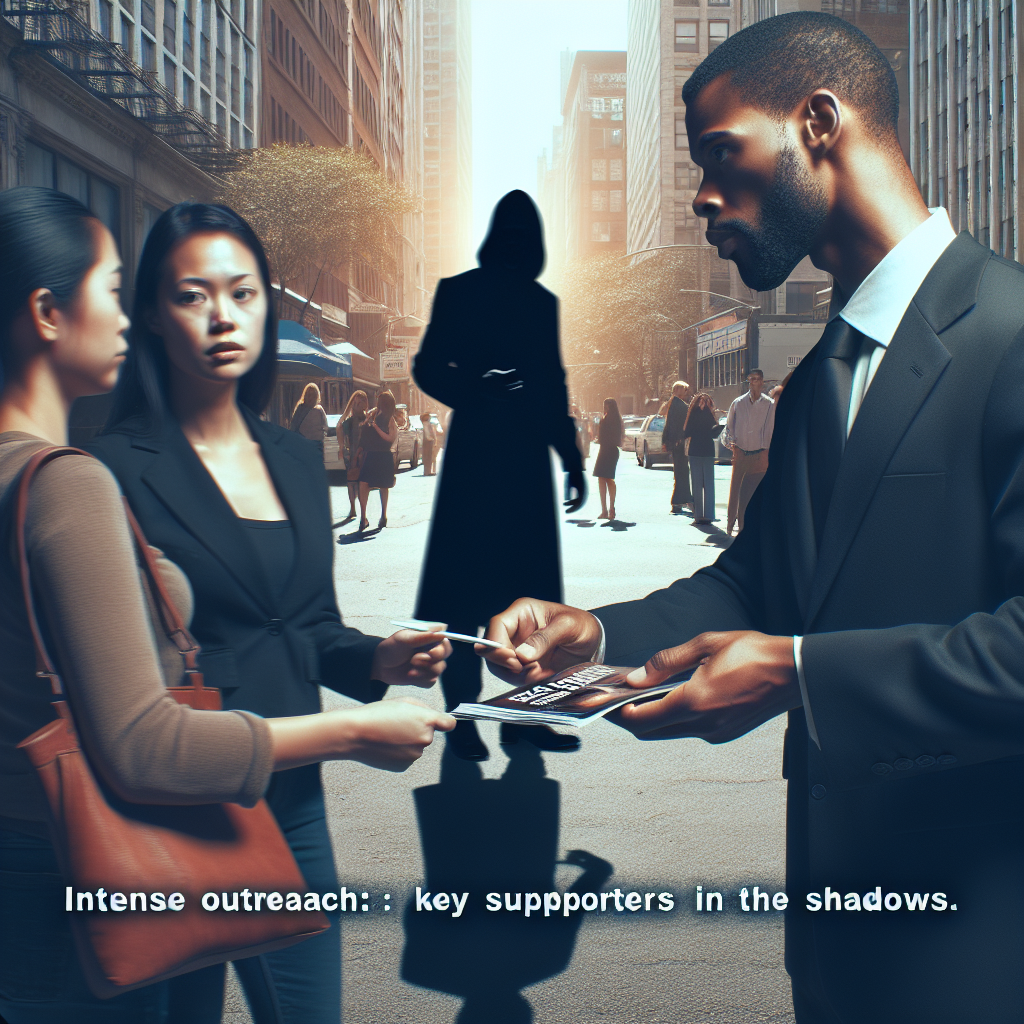This week, Vice President Kamala Harris’ campaign is making its most definitive move to engage Black men, announcing a comprehensive suite of policy proposals, enhanced programming, and a media campaign aimed at connecting with Black male voters, especially as Republicans seek to attract this traditionally Democratic demographic.
“As we head into the final stretch, she aims to directly address a vital constituency for her: Black men,” stated Michael Tyler, the communications director for the Harris-Walz campaign.
On Monday, the vice president introduced her “Opportunity Agenda for Black Men.” The agenda includes a plan to offer up to 1 million fully forgivable loans of up to $20,000 for Black entrepreneurs, increased funding for training, mentorship, and apprenticeship initiatives aimed at helping Black men secure jobs in high-demand fields, and the legalization of recreational marijuana. It also emphasizes ensuring that Black men can access wealth and employment opportunities in this emerging market.
“This agenda is a significant step forward in Vice President Harris’ Opportunity Economy, where Black men are empowered with the resources they need to succeed: to purchase homes, support our families, start businesses, and accumulate wealth,” said Cedric Richmond, co-chair of the Harris-Walz campaign.
Historically, Black men have predominantly voted for Democratic candidates, though their turnout has typically lagged behind that of Black women. This election cycle has seen polling indicate a significant gender gap, with Trump performing well among men of all races. Republicans are attempting to seize this opportunity, raising concerns among Democrats about a potential — albeit slight — shift in Black voter attitudes.
Even a marginal decrease in support from Black men for Harris could be crucial, considering the narrow margins in swing states.
Approximately 90% of Black men voted for President Joe Biden in 2020; however, a recent New York Times/Siena College poll indicates that only 78% are currently inclined to vote for Harris, with 15% supporting former President Donald Trump.
Additionally, a recent Howard University poll found that 82% of Black voters in battleground states plan to vote for Harris, while 12% will vote for Trump, and 5% remain undecided. Notably, Trump’s support has increased significantly among Black men under 50, with over 20% intending to support him this November.
Former President Barack Obama raised concerns regarding these voting trends during an event in Pittsburgh last week, highlighting the lukewarm support among Black men for Harris.
“On the other side, you have someone who consistently shows disregard not only for communities but for you as individuals. And you’re contemplating sitting this one out, coming up with all sorts of justifications,” Obama remarked. “That concerns me because it makes me wonder — and I’m speaking directly to men — if it’s a struggle with accepting the notion of having a woman as president, leading you to seek alternative candidates and excuses.”
Several prominent Black Republicans responded to Obama’s comments, suggesting they exemplify the entitlement they believe Democrats hold over Black voters. They criticized the former president for labeling Black men’s concerns as misogynistic rather than recognizing valid criticisms directed at the Democratic Party.
“He’s reinforcing our argument,” stated Sen. Tim Scott, R-S.C., on X in response to Obama. “Yes, Black voters are distancing from the Democratic Party, but not for the ridiculous reasons he posits. They’ve reached their limit.”
The Trump campaign’s “Black Men for Trump” advisory board, which was established in September to focus on messaging and outreach, called Obama’s remark “insulting.”
“Black Americans are not a monolith, and we don’t owe our votes to any candidate simply because they ‘look like us.’ It’s condescending to imply we can’t critically assess a candidate’s record,” the board commented.
Trump interpreted Obama’s remarks as an acknowledgment of his potential supremacy within this voter group, posting on his social media platform, “Obama acknowledges Zero enthusiasm for Kamala, particularly among Black Men.”
In an interview with The Shade Room, Harris responded to Obama’s comments by reiterating her commitment to “earn the vote” of Black men, while also noting that Obama underscored the “danger” of a potential Trump re-election.
A senior official from the Harris campaign told NBC News they are “very, very supportive” of Obama’s remarks, seeing them as a catalyst for important discussions regarding Black men’s electoral choices.
“He has opened the door for internal discussions, encouraging candid dialogues about specific dynamics impacting this segment of the electorate,” the campaign official noted. “The more Black men recognize their central role in political discourse and their electoral power, the more beneficial it is.”
The Trump campaign also sees the advantage in placing Black men at the forefront of the conversation, asserting that Trump’s overarching message of economic revival and nostalgia for pre-pandemic prosperity, along with notable endorsements from figures such as rapper Lil Wayne, will bolster his appeal.
“Black men prioritize being the primary earners in their households and seek secure jobs with competitive wages. Ultimately, President Trump’s economic policies have provided more avenues for building generational and lasting wealth for Black families, which voters of all backgrounds recognize,” said Janiyah Thomas, the Black media director for the Trump campaign.
While the Trump campaign has organized fewer events focused on Black voter engagement and invested less in targeted advertising for this demographic, Trump has engaged with Black business leaders in Atlanta and hosted events aimed at appealing to Democratic-leaning Black men.
Last month, Scott initiated the first of several planned “Black Empowerment” financial literacy events across key battleground states.
Harris’ focus on wealth-building as part of her outreach to Black men is a result of months of efforts to counter Trump’s economic messaging.
In April, she initiated an Economic Opportunity Tour across the nation that showcased the record pace of Black business ownership and the historically low unemployment rates for Black individuals that have occurred under the Biden-Harris administration. Political strategist Leo Smith, who has conducted focus groups with Black men in Georgia, believes this approach resonates.
“The vice president is performing well, which runs counter to the typical Democratic stance. She’s actively promoting an economic agenda centered on homeownership and business ownership. These are the issues that resonated with Black men in Trump’s policies,” Smith commented.
This shift has already demonstrated her ability to gain traction with Black groups that have historically been skeptical of Democratic candidates.
Recently, a super PAC representing over 50,000 Black men, the Justice Equality and Economics PAC, endorsed Harris’ campaign, a notable change from their support of Georgia Republican Gov. Brian Kemp over his Democratic opponent Stacey Abrams two years prior.
Omar Ali, the PAC’s founder, stated that the endorsement followed dialogues with various members of Harris’ team, including executive branch staff and campaign surrogates.
“We presented our suggestions for policy changes to support small and African American businesses. Their willingness to engage in these dialogues and recognize the need for change was significant enough for us to endorse them, given the unresponsiveness from the other side,” Ali explained.
Ali had sought similar discussions with the Trump campaign but faced challenges, finding it “difficult” to reach senior campaign officials after interactions with staff at the state level.
Ultimately, he was offered a chance to pose for a photo with Trump at a rally, a gesture he deemed “highly disrespectful.”
The Trump campaign declined to comment on Ali’s statements.
Harris’ initiative aimed at Black men coincides with a media outreach effort, as she has participated in interviews tailored to resonate with Black audiences this month.
On Sunday, after meeting with 50 Black faith leaders and speaking at a predominantly Black church in Greenville, North Carolina, Harris engaged in an interview with Roland Martin before recording another with Justin Carter of The Shade Room.
On Tuesday, Harris is set to join a radio town hall with popular host Charlamagne tha God. Earlier this month, she also appeared on the “All the Smoke” podcast with former NBA players Stephen Jackson and Matt Barnes.
The Harris campaign is also increasing programming specifically aimed at Black men, partnering with Black male celebrities, influencers, and activists for “Black Men Huddle Up” events in pivotal states, as well as hosting NFL and NCAA watch parties to facilitate discussions on election stakes. The campaign’s Black voter engagement team will continue hosting barbershop roundtables, canvassing efforts, and a Black men’s forum discussion in Milwaukee this week.
Harris will be supported by notable Black entertainers and athletes, including musicians Jermaine Dupri and John Legend, who have attended campaign events in Atlanta recently, as well as NBA legend Magic Johnson, who co-chairs the campaign’s Athletes for Harris coalition.
“We need to mobilize our Black men to vote. That’s our top priority. Kamala’s opponent made numerous unfulfilled promises to the Black community last time, and we must ensure Black men understand that,” Johnson urged at a Harris rally in Flint, Michigan this month.






